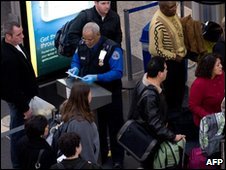 The US has introduced tougher screening rules for passengers arriving by air from 14 nations which the authorities deem to be a security risk.
The US has introduced tougher screening rules for passengers arriving by air from 14 nations which the authorities deem to be a security risk.Travellers from Nigeria, Pakistan, Syria, Iran, Sudan, Yemen and Cuba will be among those facing body pat-down searches and carry-on baggage checks.
It follows an alleged attempt to blow up a plane on Christmas Day.
US President Barack Obama has been under pressure to make visible security improvements.
He promised to act quickly to fix flaws in the security system, in the wake of the alleged bomb plot.
The new security directives came into effect on Monday.
But the BBC's Jane O'Brien in Washington says it is unclear whether a pat-down could have found the device investigators say the alleged would-be bomber, 23-year-old Umar Farouk Abdulmutallab, had in his underwear.
The Transportation Security Administration said in a statement the new rules apply to flyers coming from or via countries on the US state department's sponsors of terrorism list - Cuba, Iran, Sudan and Syria.
Random checks
The other nations whose passengers face enhanced screening include Afghanistan, Algeria, Iraq, Lebanon, Libya, Nigeria, Pakistan, Saudi Arabia, Somalia and Yemen.
As part of the new guidelines, passengers travelling from any other foreign country will also be checked at random.
The main suspect in the alleged airliner plot is Nigerian, and Yemen-based militants have said they trained and equipped him.
Hours after the measures were announced, there was an alert at Newark International Airport near New York City as a man entered a secure area without being screened.
Terminal C was locked down and passengers were evacuated from the secure area, while some flights were grounded.
The man was not found, but officials said every passenger was fully re-screened.
Civil rights activists criticised the new measures.
Nawar Shora, of the American-Arab Anti-Discrimination Committee, told US media: "This is extreme and very dangerous.
"All of a sudden people are labelled as related to terrorism just because of the nation they are from."
Earlier, UK Prime Minister Gordon Brown gave the go-ahead for full body scanners to be introduced at Britain's airports.
Embassies shut
The machines are expected to be installed at London's Heathrow Airport and other hubs within weeks.
Also on Sunday, both the US and Britain closed their embassies in Yemen, citing security threats.
John Brennan, the US deputy national security adviser, said an al-Qaeda offshoot had "several hundred members" in Yemen.
Last week, a Yemen-based group called al-Qaeda in the Arabian Peninsula urged Muslims to help in "killing every crusader who works at their embassies or other places", as it claimed the alleged US plane bomb plot.
The US mission in Sanaa was the target of an attack in September 2008, which was blamed on al-Qaeda, and in which 19 people died, including a young American woman.
Also on Saturday, Gen David Petraeus, head of US military operations in the Middle East and Central Asia, visited Yemeni President Ali Abdallah Saleh to pledge US support for the fight with al-Qaeda.
The visit came a day after the general announced that the US would more than double counter-terrorism aid to Yemen this year.



